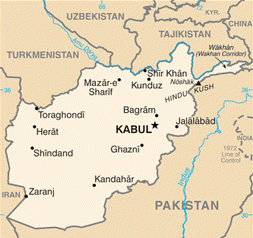Less than a week after the US officially designated the Taliban-aligned Haqqani network a terrorist organization, declassified documents reveal the founder of the group advocated cooperation with the US in meetings with American diplomats two years before the 9/11 attacks.
 In a document released Tuesday, a State Department cable describes US officials meeting in May 1999 with Jalaluddin Haqqani who was informally representing the Taliban regime.
In a document released Tuesday, a State Department cable describes US officials meeting in May 1999 with Jalaluddin Haqqani who was informally representing the Taliban regime.
In the meeting, a US diplomat urged the Taliban to expel Osama bin Laden, who at the time was wanted over the bombings of US embassies in Kenya and Tanzania a year earlier.
But Haqqani insisted that the Taliban had placed “tight controls” on bin Laden and that the best solution for the US might be for the al-Qaeda leader to stay in Afghanistan.
Haqqani requested cooperation and dialogue with the US. “Iran, China and Russia want to take over Afghanistan and run it for their gain,” he said. The “US and Saudi Arabia could help Afghanistan maintain its independence. Do not turn away from us anymore, but deal with us,” the cable quoted him as saying at a time when the Taliban government was seeking international recognition.
US ties to the Haqqani network go back to Reagan administration policy of funneling money and weapons through Pakistan to Islamic fighters in Afghanistan against the Soviets. Back then, the Haqqani network were freedom fighters. Now the US says they’re officially terrorists, illustrating the whole farce of formal State Department terrorist designations.
The cable said that Haqqani – “stroking his black beard and adjusting his white turban” – expressed gratitude for US support against the Soviets, but criticized the cruise missile strikes ordered by president Bill Clinton after the embassy bombings.
According to other declassified documents published at the National Security Archives, “the [Clinton administration] strikes not only failed to hurt Osama bin Laden but ultimately may have brought al-Qaeda and the Taliban closer politically and ideologically.”
“A State Department cable [from 1999] argues that although the August missile strikes were designed to provide the Taliban with overwhelming reason to surrender bin Laden, the military action may have sharpened Afghan animosity towards Washington and even strengthened the Taliban-al-Qaeda alliance,” reports the Archives.
The declassified documents illustrate the opportunities missed by the US in pre-9/11 Afghanistan. Though airstrikes in Afghanistan following bin Laden’s attacks on US embassies ultimately brought the Taliban and al-Qaeda closer, the US may have had opportunities to influence the Taliban away from hosting bin Laden, and America and Afghanistan may have had very different histories for the first decade of the 21st century.


